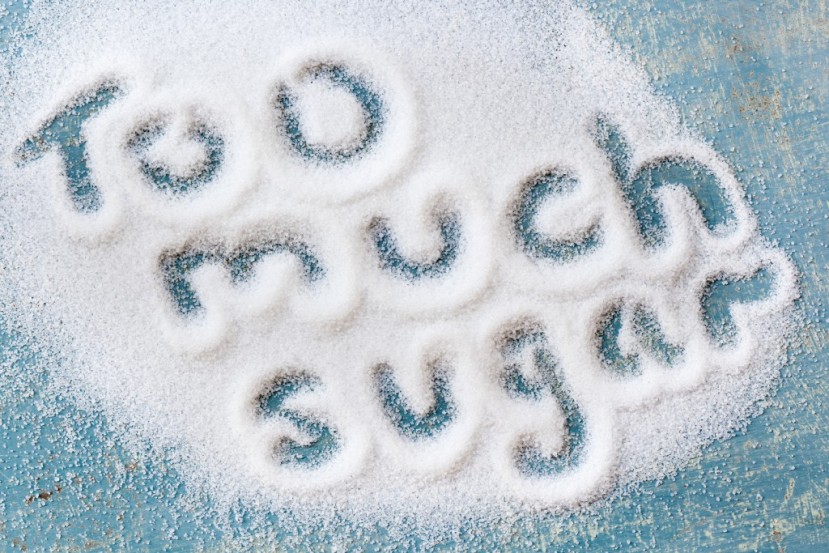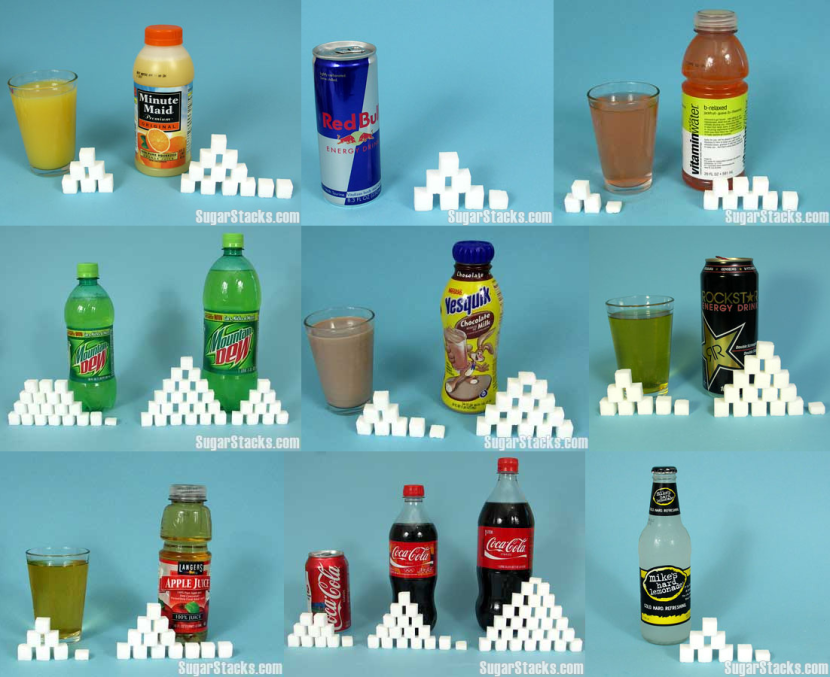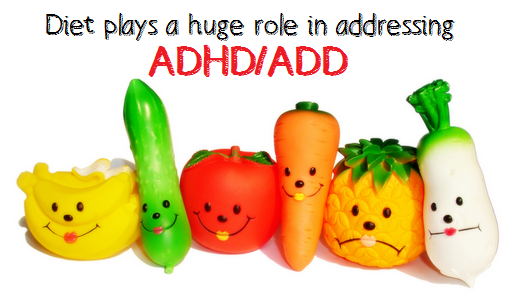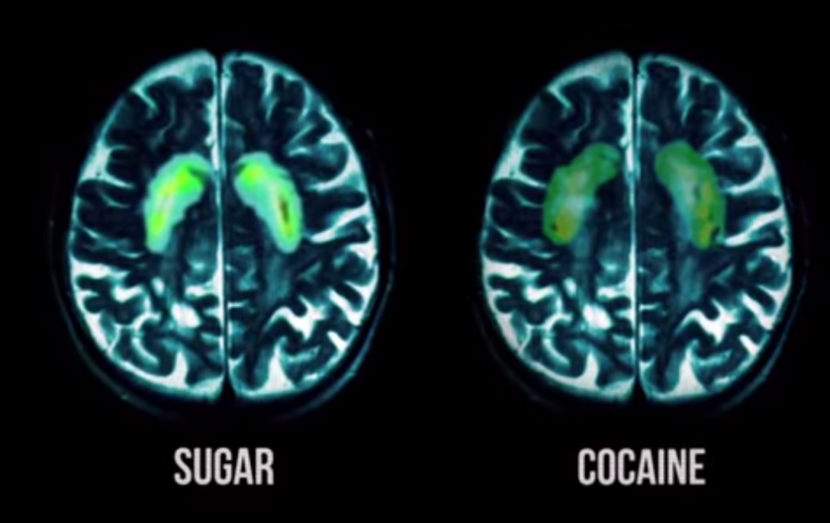Tagged: soda
Sugar Isn’t Just Sweet
Three years ago I posted an article All Sugars Are not Equal and now lately I’ve been fielding a lot of questions about sugars and sugar substitutes, so I thought it was time to remind you all that Sugar Isn’t Just Sweet!

Sugar, in all its forms is highly addicting to our brains via our tastebuds. Sugar is in so many foods naturally (like all fruit), and then for some reason our commercial food industry has decided to add in more sugar — probably because it makes us crave the items more and therefore boosts their sales. As any annoying example I cite regularly, several American producers feel the need to ADD refined sugar (or even worse High Fructose Corn Syrup) into their apple sauce or apple juice. It’s apples for goodness sake – it’s already sweet!

The real problem is that so many people are unaware of just how much sugar they’re ingesting (or allowing their children to consume) and further, they don’t understand why sugar is so bad for our bodies. It’s simple, sugar — ESPECIALLY REFINED SUGAR — attacks our immune systems, increases high cholesterol, causes systemic inflammation, confuses our metabolisms and therefore stores as fat (i.e., weight gain) and pushes our blood systems towards diabetes.

To combat only two of the above-listed issues, once again commercial food entities diddled-about in their labs and came up with sugar substitutes that were “lo-calorie” and safer for diabetics. Unfortunately, a whole slew of other issues came about with some of these subsitutes, the least of which is cancer. In case you’re still confused about refined sugar vs. sugar substitues vs. natural sugars, here’s a quick recap:
There’s table sugar – white refined sugar — that we all grew up with, and it’s subsidiaries of powdered sugar and brown sugar (refined white sugar with molasses added). This comes from the sugar cane plant and/or sugar beets plant. Like all sweet plants (fruits and vegetables), it has a sweetness to it that we have labeled as SUGAR. The Sugar Cane is not a bad plant, but it’s the process we have developed to refine that sweetness is bad.

The term “refining” means to remove by a purification process, certain coarseness or impurities. Sugar refining is the process of extracting out the sugar (sucrose) from the plant materials and then removing other unwanted materials from the extracted raw sugar. These substances can include remaining stalk fibers, soil, insect parts, molds, bacteria and waxes.
The refined white sugar product is now over 99.9% sucrose and for all practical purposes contains no nutritional elements such as vitamins, minerals, proteins or fibers. What is left consists of pure, refined carbohydrates that the body cannot utilize. Worse yet, refined sugar drains and leaches the body of precious vitamins and minerals through the demand its digestion, detoxification and elimination makes upon one’s entire system.

With Refined Sugar being seen as the enemy we began to create foods labeled as “sugar free.” Here is where one of the first misunderstandings comes in. They are NOT sugar free. They are refined sugar free. These “sugar free” foods usually contain one of the following sugar substitutes:
NutraSweet or Equal (aspartame)
Splenda (Sucralose)
Saccharin or Sweet N Low (benzoic sulfilimine)
Stevia
Xylitol
Coconut Sugar
The first three are man-made chemical products, praised for having no calories, but criticized (rightfully so) for being so foreign to the body that they offer no benefit, and in fact can be very harmful. The last three(Stevia, Xylitol and Coconut) come from plants and are less offensive than any other choice of sweetener (real or artificial), but they still put SUGAR into the body.

Other sweeteners like honey, agave, and maple syrup are “safer” to some esxtent, but the issue still remains that our bodies can really only handle so many grams of sugar per day before our systems are negatively affected. (Remember even alcohol turns into sugar in our bodies.) Even Raw Sugar is better than refined, but you’re still left with one important issue: too much sugar – of any type – in our blood streams is bad (worse yet for those with allergies, diabetes or autoimmune diseases such as MS).

So the real question you need to pose to yourself in regards to your nutritional health, is how much SUGAR should you eat per day. In other words, the maximum number of grams of sugar in any shape or form. The American Medical Association suggests no more than 25 grams of sugar per day (which equals 6 teaspoons). Did you know there are 19 grams of sugar in a medium sized apple? There are 40 grams of sugar in a can of Coke! How many grams are in your latte, your salad, your sandwich? Refer to the chart below to see just how many teaspoons of sugar (1 cube = 1 teaspoon) are actually lurking in some of our foods. Six teaspoons is VERY easy to achieve and quickly surpass in your daily nutrition, even if you believe you eat “healthy.”

So take a hard look at what you eat and know how much of any substance you’re consuming, whether it be sugar, sodium, etc. Keep a balanced diet, and try to keep your sugars (in all their forms) to a moderately low level.
What Are Your Kids Drinking?
Today I am getting back on my “nutrition for kids” soap-box to address a continuing trend of parents thinking it’s okay to give kids lemonade and 7-up (or any soda) with their meals. Every time we eat out with our daughter I see other kids getting lemonade or clear soda (7-up, Sprite) with their meals. At my daughter’s school every open-house, award ceremony or celebration includes cookies and 7-up or lemonade. I want to scream out “why are you offering them sugar and sugar? Don’t you know how bad that quantity of sugar is?”
If you’ve followed my blog for any length of time, you know that I’m all about moderation, and that includes sugar. But I am astonished to see how little regard these two innocent-seeming liquids appear to have with parents.
Just on simple logic, I would think if you’re ordering high fat and carbs “kid-friendly” foods like mac n’ cheese, chicken fingers and fries, or pizza, that you’d opt for water to at least balance out these nutritionally void meals. Add into the equation that kids often get dessert after such a meal, and you’ve just given them plenty of sugar. But no, the world at large thinks nothing of sugar + sugar where kids are concerned.
Many parents and restaurants offer fruit juices as an option, thinking that these are healthier. Well, I’m here to tell you they’re not. Perhaps you need an in-your face assessment of what is really in these drinks?
8 oz of Lemonade (like Minute Maid) = 27 grms Sugar
8 oz of Orange Juice = 24 grms Sugar
8 oz of Apple Juice = 26 grms Sugar
8 oz of 7-Up/Sprit = 26 grms Sugar
8 oz of Coke = 26 grms Sugar
1 Capri Sun packet = 18 grms Sugar
8 oz Nesquik Chocolate milk = 29 grms Sugar
(Don’t forget, you often give them refills too!)
Now you might be saying “so what? What’s so bad about 26 grams of sugar?” Well, besides the fact that it offers no nutritional value, it can damage their metabolism, and increase their risk of obesity and type II diabetes, among other health issues (like mood swings and hormonal spikes). I’m not even touching upon the deadly high-fructose corn syrup issue (in sodas), or the quantity of sugars in a Jamba Juice or other seemingly “healthy” juices.
The American Heart Association has set guidelines for the limits of added sugar that kids should consume each day. (Added sugar means “refined sugar or sugar substitutes” as fruit and other foods contain natural sugars.) The amount of added sugar that a child should consume on a daily basis varies depending on the child’s age and caloric intake, but here’s their basic recommendation:
Preschoolers should limit added sugar to about 16 grams per day
Children ages 4 to 11 should limit added sugar to about 12 grams a day
Pre-teen and teens should not have more than 20 to 32 grams per day
Clearly you can see how one drink at lunch has already maxed out the quantity of added sugar your child consumes. Now factor in any desserts or sweet-treats they’ve consumed that day and you’ve easily overloaded their sensitive systems.
I was criticized repeatedly when my daughter was a baby because I didn’t give her any refined sugar until she was 2. No birthday cake, ice cream, candies, fruit yogurt, or fruit juice. I was called controlling, silly, and even, albeit jokingly, evil. My Father-In-Law asked once why I didn’t give my toddler apple juice. I replied that she had a bowl-full of apple slices in front of her and a bottle of water and once in her stomach she would have “apple juice.” (He didn’t find my sarcasm funny.) I did point out that this way she was getting fiber that is missing from filtered apple juice, but he’d already tuned me out.
The reality is that America loves it’s sugar and many well-meaning parents blindly fall into line with their children’s nutrition. But hopefully you’ll stare a little longer at the facts posted above, and at least think twice next time before giving your children that innocuous little beverage. Perhaps on another day I’ll bring up the issue of rampant use of sodium in America and how much of that harmful substance you and your children are consuming, but today my attack is on sugar. Have a sweet day!





